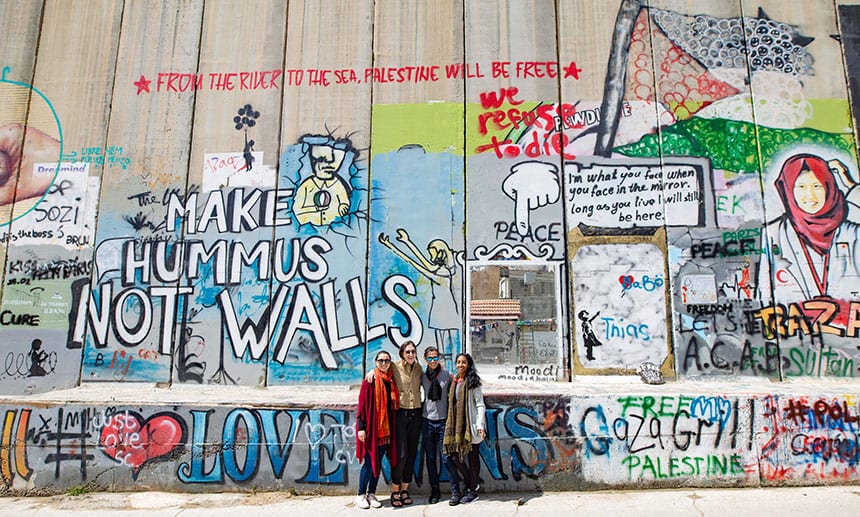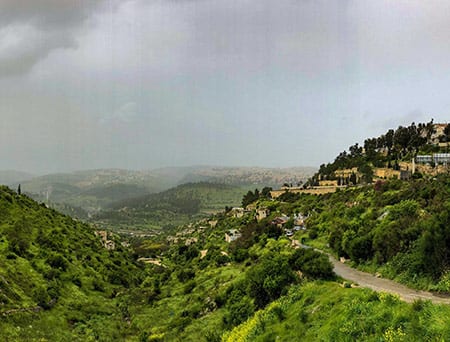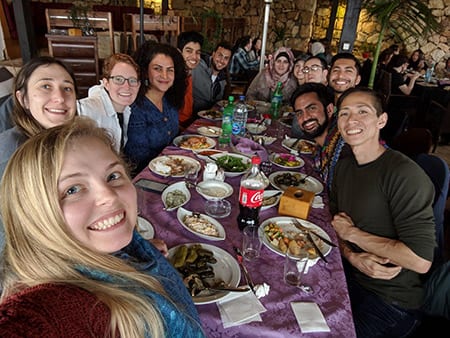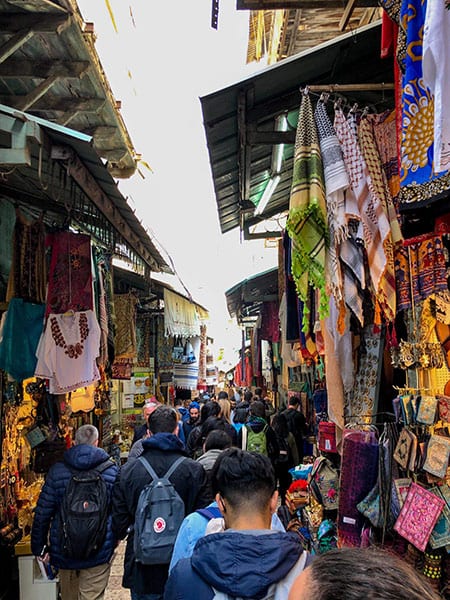
By Rachel DeLetto
For 43 UC Berkeley graduate students—including 19 from Berkeley Law—an educational spring break trip to Palestine offered current-day parallels with some dark chapters in America’s legal history.
“In Constitutional Law, we learn about institutionalized and legal segregation that persisted in U.S. schools until Brown v. Board,” says Nadim Houssain ’20. “In Hebron today, Palestinian children aren’t allowed to go to Israeli schools. There are settler-only roads that cut through the West Bank, Palestinians aren’t allowed to drive or walk on these roads.”

Houssain helped organize Berkeley Law’s first Palestine Trek (PalTrek), after participating in it as a student at Harvard’s Kennedy School of Government, with Zainab Ramahi ’19.
“So much of what we hear about that region is filtered through the media,” says Ramahi, whose grandmother lives in Palestine. “This trip was an opportunity to see what’s inaccessible to most, and for each student to make sense of it for themselves.”
On top of coursework and clinics, Ramahi and Houssain dedicated themselves to planning the trip and fundraising. They hoped to gather 20 students, but were thrilled to get more than twice as many applications from the law school, Goldman School of Public Policy, Haas Business School, and the School of Journalism. A crowdfunding campaign and the support of local Palestinian business owners helped subsidize students in need of financial support.
While aware of the region’s conflict, Amanda Miller ’20 knew little about Palestine or its people. She went on PalTrek because “it seemed like a once-in-a-lifetime opportunity to witness the reality of the occupation.”
A full experience
Trekkers met with high-profile leaders such as Omar Barghouti (co-founder of the Boycott, Divestment, Sanctions Movement) and Haneen Zoabi, a Palestinian member of Israel’s parliament.
They also heard from the mother of two children who have been imprisoned by Israel’s military for the past two years, one of whom was arrested at the age of nine. Former Israeli Defense Force soldiers described how the law applies differently to Israeli and Palestinian people in the same territory. While settlers are governed by Israeli civil law, Palestinians are subject to military law, Houssain explains.

Trekkers also visited historical sites such as the Old City of Jerusalem, Church of the Holy Sepulchre, Western Wall, and Dome of the Rock. They ate Palestinian food, learned the traditional folk dance (Dabke), and toured a soap factory that has been in operation for hundreds of years.
Coming from UC Berkeley, the birthplace of the free speech movement and academic freedom, a gathering with students from Birzeit University was particularly poignant for the trekkers. Birzeit students said that the Israeli military raid the campus several times a year to arrest student leaders of social movements.
“There’s always that constant threat,” Ramahi says. “Yet these students persist in raising their voices, placing demands, and trying to envision a brighter future for themselves and their people.”
Far-reaching effects
The Berkeley students also saw how Palestinians and Israelis being subject to different sets of laws affects myriad issues—from water access to commerce to technology.
“Palestine got 3G internet less than two years ago, while Israel has had it since 2004” Houssain says. “They had been applying for a permit for a long time, but anything that’s built in the West Bank needs to go through the Israeli government.”
Trekkers saw how the twenty-six-foot high barrier built along the Green Line, the UN demarcation separating the West Bank from Israel, runs twice as long as the actual Green Line.

“It cuts through Palestinian villages, separating them from their own land, from the schools they’ve attended for years, or from their families,” Ramahi says. “Palestinian laborers are smuggling themselves over the wall to find work.”
Miller, an aspiring civil rights attorney, says, “Seeing the role of law perpetuate inequity helped create a more critical lens into our own legal system, and the similar injustices it perpetuates domestically and internationally.”
A first-hand look
Students were also exposed to a real-time example of the disparate treatment of Palestinians.
As a Palestinian, Ramahi knew she might be denied entry into Israel. She had prepared a thorough dossier: three copies each of her U.S. and Canadian passports, verification of enrollment forms, her CalCentral profile showing her current classes, and an email from the federal judge that she will be clerking for next fall.
But upon arrival at the Tel Aviv airport, border officials had no interest in seeing her paperwork.
She was taken to secondary immigration, which came as no surprise. Ramahi says she routinely faced heightened scrutiny, including 13-hour interrogations, on previous trips there to visit family. This time, she wasn’t asked any questions.
Two large, non-uniformed men escorted her to a van with a cage inside, and she was told only that she would be deported on the next flight out 24 hours later. Locked in a cell without being informed of any rights she may have had, Ramahi was not allowed any form of communication. She says she was afraid for her safety and worried she might be forgotten.
But eventually she was escorted to an airplane that would take her home to the U.S. “I had a really deep sense of freedom when they handed me my passport,” she says.
Despite that ordeal, she is “proud that we did something like this here at this law school,” and that students could see “a spirit, resilience, liveliness among the Palestinian people that you have to experience to believe.”
“A leader of a refugee camp reminded us that while Palestinians are constantly fighting for their humanity and dignity, they are simultaneously constantly engaging in ‘beautiful resistance,’” Miller says. “It was an honor to experience that alongside them.”